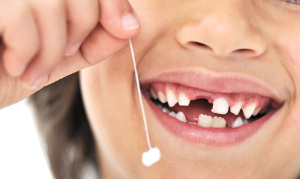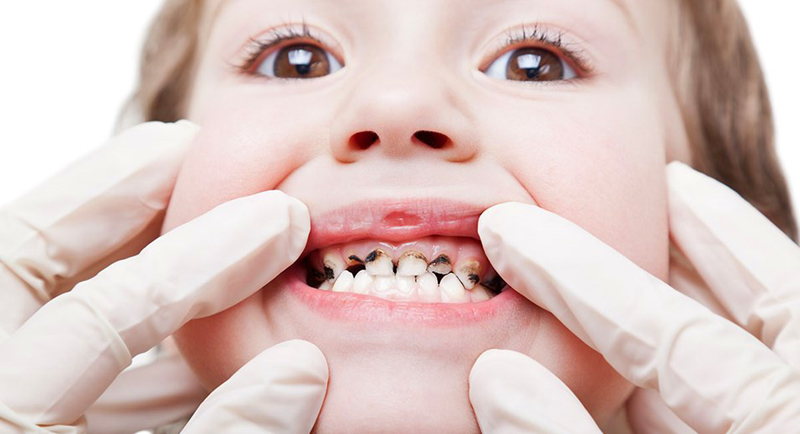EXTRACTION OF MILK TEETH
The content of the article: 
- CONSEQUENCES OF EARLY EXTRACTION OF MILK TEETH
- CONTRAINDICATIONS FOR THE EXTRACTION OF MILK TEETH
- ADVANTAGES OF CHILDREN’S DENTAL CARE IN THE CLINIC “Nino Beridze's Orthodontic Center"
- BASIC TECHNIQUES OF ANESTHESIA IN PEDIATRIC DENTISTRY WHEN EXTRACTING MILK TEETH
In some cases it is necessary to exercise the option of premature extraction of milk teeth. There are reasons for that:
- Almost complete destruction of the tooth affecting the root zone
- Pulpitis
- Severely traumatized tooth with sharp obstructive edges that cause pain when chewing and which constant licking causes tongue and mouth irritation and in some cases gingivitis or even stomatitis
- Milk tooth prevents eruption of a permanent tooth
Anyway, you should remember that early loss of milk teeth may have rather undesirable consequences.

Since temporary milk teeth are in charge of chewing and proper digestion and in the process of facial skeleton growth and formation – their role is hardly to overestimate. They are involved in many processes:
- Development of chewing muscles
- Development of a correct occlusion
- Correct articulation – pronunciation of sounds and words
- Keeping to the spatial balance and maintaining space for permanent teeth
When an active growth of jaws comes to an end, starting from 6 years of age milk teeth are gradually replaced by permanent. Usually this process ends at the age of 12-13 years, but there are cases of later replacement, when permanent teeth appear at 17-18 years old.
Lower incisors are replaced first, then – central upper, after that fall out upper lateral incisors, after which begins posterior replacement. At last, one can observe eruption of canines. Early removal of milk tooth can lead to the fact that neighboring teeth will start occupying its place. Therefore, when the time comes for the eruption of a permanent tooth, replacing the extracted one, this tooth will have to seek spare place elsewhere – on the top, sideways or behind the teeth row.
It is better to refuse from the extraction of milk teeth in the following cases:
- By “flourishing” gingivitis and stomatitis, if they were not caused by traumatizing of milk tooth
- Candidal lesions of the oral cavity (thrush)
- Tonsillitis and whooping cough to avoid spreading the infection and spasm of the airways
- Vascular tumor
Kidney, heart diseases and vascular pathology may also be relative contraindications for the extraction of milk teeth. Only a highly professional dentist can take a decision on the possibility of such a procedure – he can estimate all pros and cons of the extraction.
ADVANTAGES OF CHILDREN’S DENTAL CARE IN THE CLINIC ''Nino Beridze's Orthodontic Center"
Professionals of the clinic ''Nino Beridze's Orthodontic Center", located in Tbilisi, David Tavkhelidze N1a str. can assist your child not only by natural replacement of milk teeth, but also by emergency extraction of milk teeth.
At doctors’ disposal there is modern equipment and the newest innovative techniques and elaborations regarding pain management and teeth extraction.
Your baby will feel comfortable in soft orthopedic chairs designed according to modern European equipment with memory-effect, where a chair takes shape of the body. Superpowerful, bright lamps and backlight of dental tools on these installations help examine the oral cavity and carry out all necessary dental procedures. Among types of anesthesia there is an innovative system of local painless computer anesthesia STA.
There are a few more kinds of anesthesia applied in pediatric dentistry:
- Local application anesthesia using gels and aerosols with pleasant flavors.
- Local infiltration anesthesia with local anesthetic into the gum.
- Sedation as an element of premedication using small nitrous oxide concentrations. This “laughing” gas does not completely “cut off” your baby, leaving him in contact and delivering him from anxiety and fear.
General anesthesia at intolerance of local anesthesia, some kind of mental and system diseases and suppurative inflammation.


